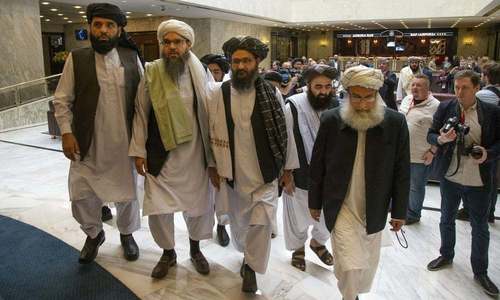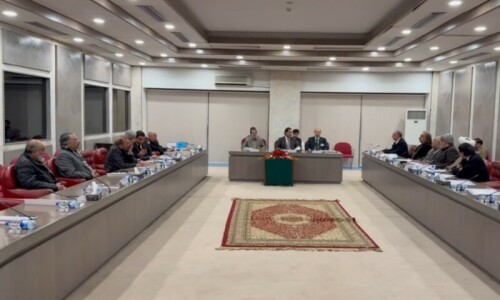KABUL: The US ambassador leading efforts to forge a deal with the Taliban met Afghan President Ashraf Ghani in Kabul on Monday and showed him the draft of a proposed agreement with the insurgents.
Zalmay Khalilzad has spent about a year meeting the Taliban in Doha in a series of talks aimed at ending America’s 18-year-old war in Afghanistan.
The prospective deal centres on a US troop reduction in return for several security guarantees from the Taliban, as well as broader peace talks between the insurgents and the Afghan government and an eventual ceasefire.
Mr Khalilzad — a former US ambassador to Afghanistan and Iraq — arrived in the Afghan capital on Sunday evening following a ninth round of talks with the Taliban in the Qatari capital.
He met Mr Ghani then and on Monday he showed the Afghan leader a draft of the US-Taliban agreement, officials said.
The discussions are significant because the Afghan government has until now been largely sidelined from talks, though any eventual deal would require the Taliban to talk to Mr Ghani, whom they view as a US stooge.
Intra-Afghan talks set to take place in Norway in the coming weeks
“The efforts of the US and other partners will yield results when the Taliban enter direct negotiations with the Afghan government,” Mr Ghani’s spokesman Sediq Sediqqi told reporters. “We hope these efforts will lead to an end to the conflict.”
When asked to describe the deal, Mr Sediqqi demurred, saying “the most important thing is that the Taliban’s violence stops”. “We are hopeful that any agreement to be signed between the United States and the Taliban results in peace and ceasefire,” he said.
Afghanistan’s Chief Executive Abdullah Abdullah said in a statement he too had been briefed and assured of “a thorough and sustainable peace in Afghanistan”.
President Ghani has appointed a 15-member delegation to meet the Taliban at “intra-Afghan” talks slated to take place in Norway in the coming weeks.
On Sunday, Mr Khalilzad said the US and the Taliban were at the “threshold” of a deal that would reduce violence and pave the way for “sustainable” peace.
But even as negotiations have entered their apparent final stage, violence has continued apace across Afghanistan.
On Saturday, the Taliban attempted to seize Kunduz in the north, and on Sunday, they launched an operation in the city of Pul-e-Khumri, the capital of neighbouring Baghlan province.
Afghan officials on Monday said Pul-e-Khumri had been cleared of Taliban fighters and fighting restricted to the outskirts.
Afghan forces, backed by local and US air power, were able to stop Kunduz falling and repel the Taliban, who briefly seized the city in 2015.
Afghan officials claimed on Monday the city was back to normal but in the afternoon a suicide bomber detonated himself near a security-forces base on the outskirts of Kunduz, killing six troops and wounding 15 other people.
The Taliban claimed responsibility for the attack.
Meanwhile, the US-led Nato mission in Afghanistan said mechanical problems had caused a coalition drone to crash in Ghor province.
US Secretary of State Mike Pompeo has previously said he hoped a peace deal would be finalised before Sept 1, ahead of Afghan polls set for Sept 28.
Suhail Shaheen, the Taliban’s spokesman in Doha, said on Saturday a deal was “near to [be] finalised” but did not specify what obstacles remain.
All of the last-minute deal-making comes less than a month before the presidential elections are due.
Despite Mr Ghani’s repeated insistence the polls will go ahead, many in Afghanistan are sceptical they will happen as planned.
Published in Dawn, September 3rd, 2019














































